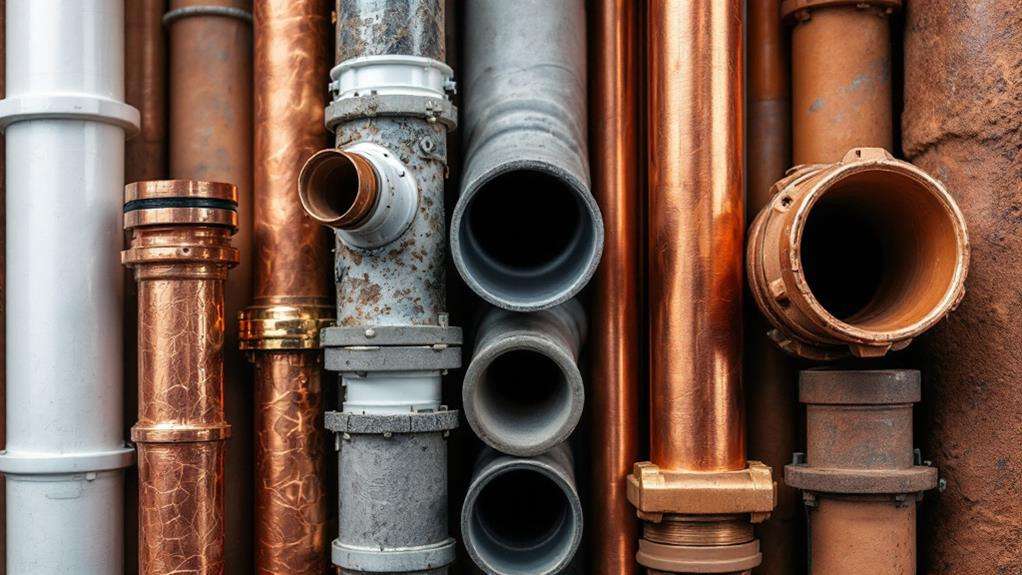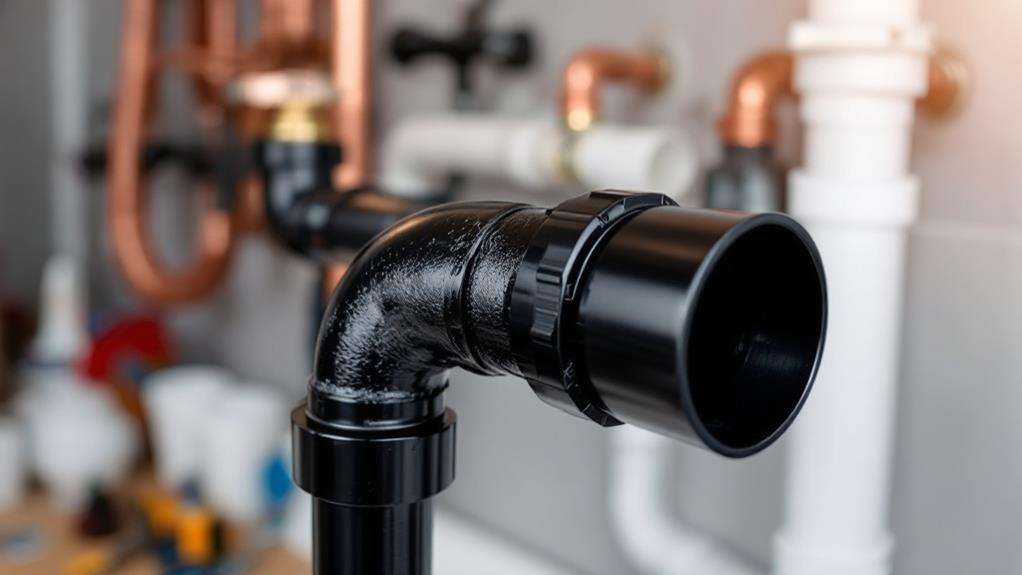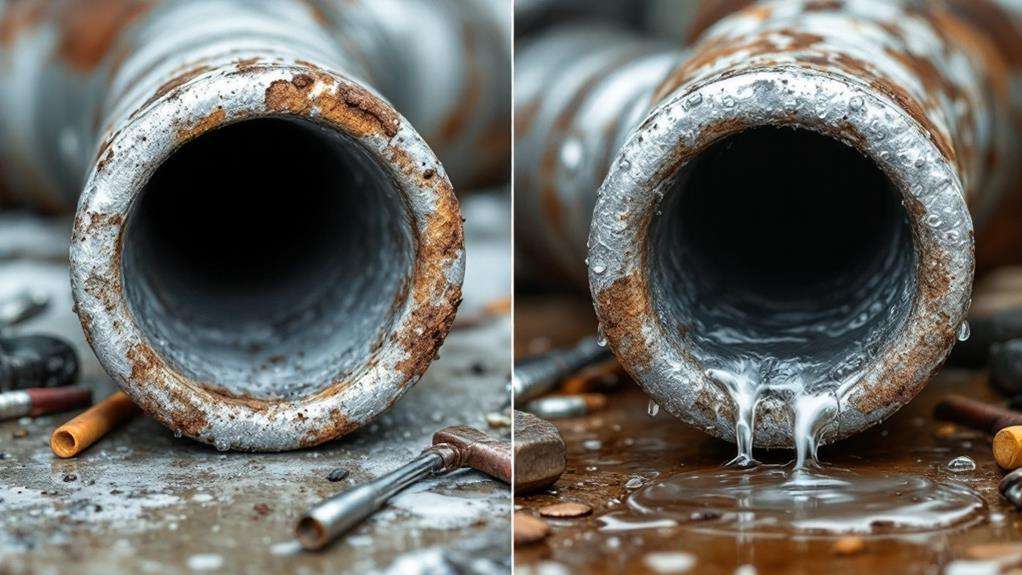Pros and Cons of Different Types of Drain Pipes

When choosing drain pipes, you'll encounter various materials with distinct pros and cons. PVC pipes are lightweight and corrosion-resistant but can be vulnerable to extreme temperatures. Cast iron offers durability and sound-dampening properties but is prone to rust over time. ABS pipes are flexible and cost-effective but may degrade in sunlight. Copper pipes are long-lasting and antimicrobial but come with a higher initial cost. Galvanized steel pipes are affordable and strong but have a limited lifespan due to internal rust. Understanding these differences will help you make an informed decision for your plumbing needs. Let's investigate each option in more detail.
PVC Drain Pipes
Among drain pipe materials, PVC stands out as a popular choice for modern plumbing systems. You'll find that PVC, or polyvinyl chloride, offers several advantages for your home's drainage needs. Its lightweight nature makes installation easier and less labor-intensive than traditional materials. PVC's smooth interior surface promotes efficient water flow, reducing the likelihood of clogs and backups in your plumbing system.
When it comes to durability, PVC excels. It's resistant to corrosion, rust, and chemical degradation, ensuring a longer lifespan for your drain pipes. You won't have to worry about frequent replacements or repairs, saving you time and money in the long run. The material's flexibility also allows it to withstand ground shifts and temperature changes without cracking or breaking.
It's crucial to consider that PVC can be vulnerable to extreme temperatures and UV radiation. If exposed to direct sunlight or used for hot water drainage, you may need to implement additional protective measures or explore alternative materials for those specific applications.
Cast Iron Pipes
Cast iron pipes have long been a staple in plumbing systems, offering unparalleled durability and sound-dampening properties. You'll find these pipes in many older homes and buildings, where they've withstood the test of time. Their sturdy construction makes them resistant to damage from high water pressure and external forces.
One of the main advantages of cast iron pipes is their ability to reduce noise from water flow, making them ideal for multi-story buildings. They're also fire-resistant and can help contain fires within walls. However, cast iron pipes aren't without their drawbacks. Durability concerns arise as these pipes age, with rust and corrosion being common issues. Over time, this can lead to leaks or even pipe failure.
Maintenance requirements for cast iron pipes can be more demanding compared to modern alternatives. You'll need to regularly inspect them for signs of deterioration and address any issues promptly. Repairs can be costly and may involve extensive work to access the pipes. Additionally, cast iron pipes are heavier and more difficult to install than their PVC counterparts, which can increase initial installation costs.
ABS Plumbing Pipes

ABS (Acrylonitrile Butadiene Styrene) plumbing pipes have gained popularity in residential and commercial construction due to their lightweight nature and ease of installation. You'll find that these pipes are resistant to impact, chemicals, and corrosion, making them a durable option for drain systems. They're also more flexible than PVC pipes, which can be advantageous in areas prone to earthquakes or ground shifts.
When it comes to cost effectiveness examinations, ABS pipes are often less expensive than their cast iron counterparts. You'll save on both material and labor costs, as they're easier to cut, join, and install. However, you should be aware of some durability concerns. ABS pipes can degrade when exposed to direct sunlight for extended periods, so they're not suitable for outdoor use without proper protection.
Another factor to bear in mind is that ABS pipes aren't permitted in all jurisdictions due to fire safety concerns. They can produce toxic fumes when burning, which may be a significant drawback in some building codes. Despite these limitations, ABS pipes remain a popular choice for many plumbing applications, offering a balance of performance and affordability for your drain pipe needs.
Copper Drain Pipes
Copper drain pipes offer a classic and durable option for your plumbing needs. Known for their longevity, these pipes can last up to 50 years or more when properly maintained. Their corrosion resistance makes them ideal for areas with acidic water, protecting against leaks and pipe damage over time.
One of copper's standout features is its thermal conductivity. This property allows the pipes to quickly adjust to temperature changes, reducing the risk of condensation and potential water damage. You'll also appreciate copper's antimicrobial properties, which inhibit the growth of bacteria and other harmful microorganisms within the plumbing system.
However, copper pipes come with a higher initial cost compared to other materials. They're also more labor-intensive to install, requiring specialized skills and tools. While copper is generally resistant to corrosion, it can still occur in certain water conditions, potentially leading to pinhole leaks.
Despite these drawbacks, many homeowners and builders choose copper for its reliability and aesthetic appeal. If you're looking for a long-lasting, efficient drain pipe solution that adds value to your property, copper might be the right choice for you.
Galvanized Steel Pipes

Galvanized steel pipes have been a popular choice for plumbing systems for decades. These pipes are coated with a layer of zinc, which provides excellent corrosion resistance and extends their lifespan. You'll find that galvanized steel pipes are durable, strong, and can withstand high water pressure, making them suitable for both residential and commercial applications.
One of the main advantages of galvanized steel pipes is their affordability compared to other materials like copper. They're also relatively easy to install and maintain, which can save you time and money in the long run. However, it's crucial to recognize that these pipes have a limited lifespan of about 40 to 50 years.
As galvanized steel pipes age, they may develop internal rust and mineral buildup, which can reduce water flow and affect water quality. You might notice discolored water or a decrease in water pressure as the pipes deteriorate. Additionally, galvanized steel pipes are heavier than other materials, which can make installation more challenging in some situations. When considering galvanized steel pipes for your plumbing system, weigh these pros and cons carefully to determine if they're the right choice for your needs.
